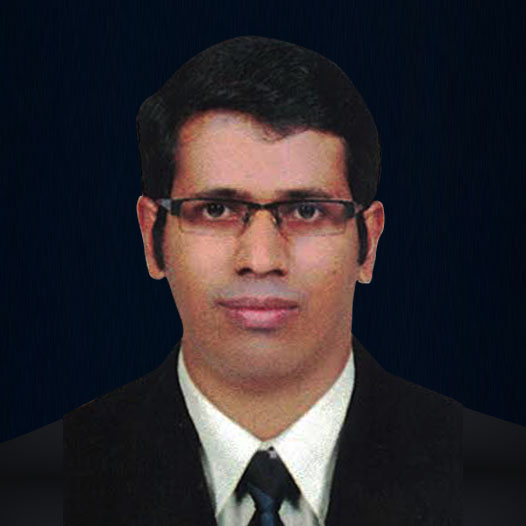Department of Mechanical Engineering
The Department of Mechanical Engineering at MEA Engineering College offers four year degree program (B Tech) in Mechanical Engineering with a yearly intake capacity of 30 students. Since its inception in 2007, the Department has been thriving to achieve academic excellence by molding quality mechanical engineers with emphasis on comprehensive learning techniques. The department is NBA accredited, equipped with adequate modern lab facilities, computer aided design lab, an exclusive departmental library in addition to the college central library and a seminar hall. Our students have been evolving through an integrated academic learning approach combining workshops, seminars, assignments,training, technical projects and self-study, by which they are familiarized with the industrial employment practices. Students are also benefited in terms of placement from the add-on and hands-on training courses offered in parallel with the B Tech. program.
Message from HoD
Mechanical Engineering integrates diverse fields in Aerospace, Automotive, Electro –Mechanical Systems, Bio mechanics, Industrial Automation etc., focusing on the analysis, design, optimization, development and maintenance of machines. Basic areas of study include Engineering Mechanics, Fluid Mechanics, Thermodynamics and Heat Transfer, Manufacturing Process and Machine Theory. The scope is infinite, ranging from materials research to product development, with plentiful employment opportunities.
The Department of Mechanical Engineering excels and takes much pride in our education efforts, allowing students to gain unique academic experiences in conducting prestigious technical events at our college. Our department has successfully hosted various inter college level technical fests which brought unique recognition and honor to the department as well as the institution. In summary, the Department of Mechanical Engineering is thriving for professional excellence, building upon which our department is confident of shaping the future of the mechanical engineering students.
Vision & Mission
Vision
To create graduate Mechanical engineers having excellence and competence in addressing the needs in the disciplines of Mechanical Engineering and allied areas at both National and International levels with a deep commitment to serving the society for bettering the standard of living through research and development
Mission
- To impart formal education in Mechanical engineering and allied areas at under graduate levels by integrating a variety of project experiences at every level throughout the curriculum.
- To be able to apply with confidence the knowledge in Mechanical engineering through research in the science and technology.
- To nurture conducive academic ambience by giving more emphasis to have competent faculty in the department of Mechanical Engineering.
- To encourage the students towards higher education through research and development activities.
Programme Educational Objectives (PEO)
- A fundamental understanding of the basic and engineering sciences and develop mathematical and analytical skills required for Mechanical Engineering.
- Expertise in designing and analyzing various mechanical engineering systems
- Ability to provide engineering designs that are based on fundamental principles by considering functionality, aesthetics, safety, cost effectiveness and sustainability
- A broad view of the context in which their designs will be implemented and the corresponding impact of these designs on society
- Capability to function ethically in professional mechanical engineering roles and exhibit good competency in their work culture.
- Awareness towards social, environmental and energy related issues and emphasize on effective communication skill and professionalism.
Programme Outcomes (PO)
- Engineering knowledge: Apply the knowledge of mathematics, science, engineering fundamentals and an engineering specialization to the solution of complex engineering problems.
- Problem analysis: Identify, formulate, review research literature, and analyze complex engineering problems reaching substantiated conclusions using first principles of mathematics, natural sciences, and engineering sciences.
- Design/development of solutions: Design solutions for complex engineering problems and design system components or processes that meet the specified needs with appropriate consideration for the public health and safety, and the cultural, societal, and environmental considerations.
- Conduct Investigations of complex problems: Use research-based knowledge and research methods including design of experiments, analysis, and interpretation of data, and synthesis of the information to provide valid conclusions.
- Modern tool usage: “Create, select, and apply appropriate techniques, resources, and modern engineering and IT tools including prediction and modeling to complex engineering activities with an understanding of the limitations.”
- The engineer and society: Apply reasoning informed by the contextual knowledge to assess societal, health, safety, legal and cultural issues and the consequent responsibilities relevant to the professional engineering practice.
- Environment and sustainability: Understand the impact of the professional engineering solutions in societal and environmental contexts, and demonstrate the knowledge of, and need for sustainable development.
- Ethics: Apply ethical principles and commit to professional ethics and responsibilities and norms of the engineering practice.
- Individual and team work: Function effectively as an individual, and as a member or leader in diverse teams, and in multidisciplinary settings.
- Communication: Communicate effectively on complex engineering activities with the engineering community and with society at large, such as being able to comprehend and write effective reports and design documentation, make effective presentations, and give and receive clear instructions.
- Project management and finance: Demonstrate knowledge and understanding of the engineering and management principles and apply these to one’s own work, as a member and leader of a team, to manage projects and in multidisciplinary environments.
- Life-long learning: Recognize the need for, and have the preparation and ability to engage in independent and life-long learning in the broadest context of technological change.
Programme Specific Objectives (PSO)
- Work in the area of Manufacturing, Thermal, Design and Fluid sciences to resolve the issues by utilizing advanced techniques.
- Design and fabrication of the mechanical tools, equipment and process with the help of domain specific software tools
- Apply the knowledge of design and production process to work effectively on multidisciplinary research areas for the benefit of society

